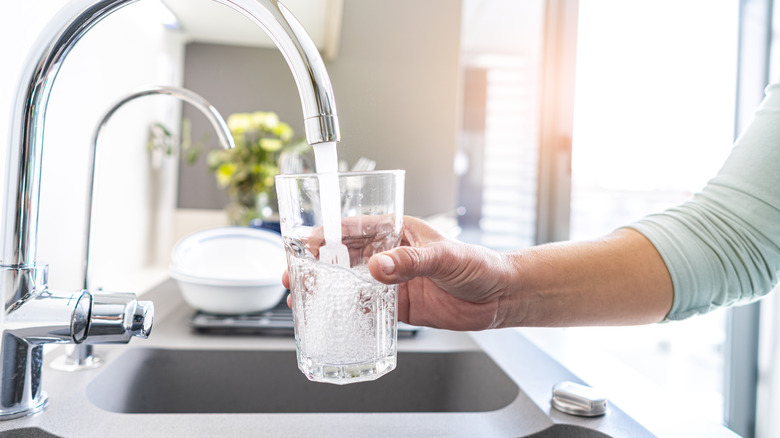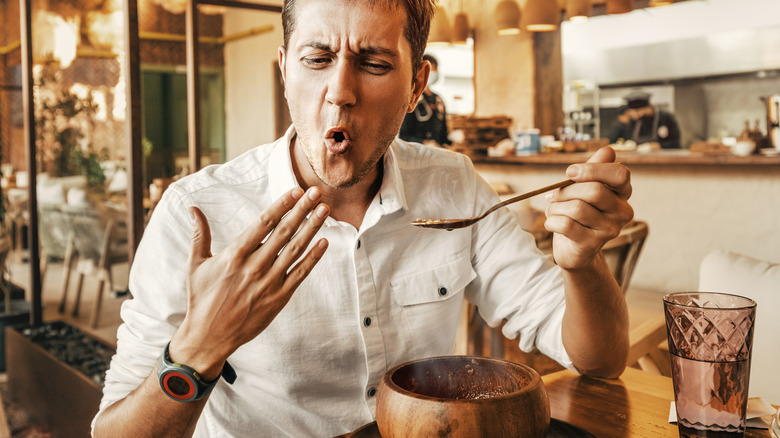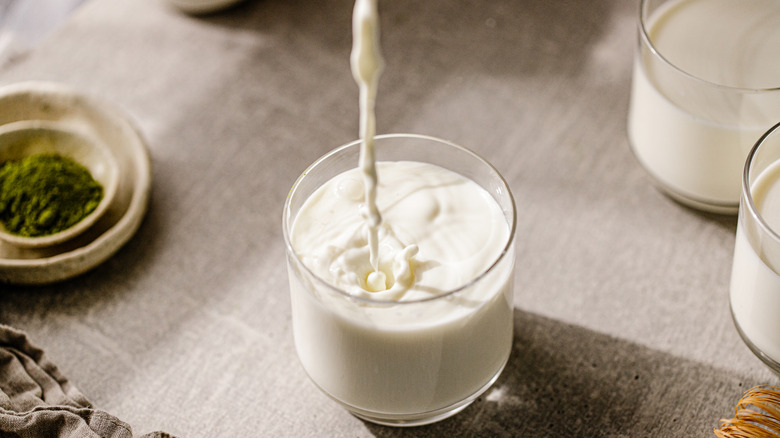Why Water Sucks At Cooling Spicy Sensations
Whether you've bitten into a slice of chili without realizing it or have overestimated your threshold for a particularly fiery hot sauce, the chain of events that follow will make your face flush, your eyes water, your nose run, your body sweat, and more importantly, make your mouth burn up. In this state of chaos that ensues after eating something spicy, some may reach for a glass of water for quick relief. But, have you ever wondered why, no matter how many glasses — or pitchers even — of cold water you gulp down, the burning barely eases?
This is because water does not help cool spicy sensations. On the contrary, it can actually make things much worse. Water tends to spread capsaicin — the chemical that makes foods like chilis spicy — all around your mouth. Essentially then, rather than soothe your burning tongue, water can leave your mouth feeling like it's more on fire than it was before, making it one of the worst drinks to gulp down when you've eaten something spicy.
Water can make spicy sensations even worse
The reason why water does such a bad job of cooling your mouth after you've eaten something spicy is because of the way it reacts to capsaicin. Capsaicin is a colorless and odorless chemical compound that is primarily responsible for making your mouth feel as if it's on fire after eating spicy foods. Our mouths have pain receptors known as TRPV1 that detect unpleasant substances such as boiling liquids, spicy foods, or bitter flavors and send signals to alert the brain (per Protein & Cell). When you eat something spicy, the capsaicin present in it binds to these TRPV1 receptors, which then alert the brain and the body that something painful is being consumed and needs to be pushed out of the system at once. This why spicy foods trigger sweating, runny noses, watery eyes, and the thirst for something cold and soothing — it's the body getting rid of the capsaicin.
To get into the chemistry of things, the reason why water does little to calm the aftereffects of capsaicin is because capsaicin is a non-polar molecule. The only way capsaicin can be pushed out of your system is if it is dissolved with the help of another non-polar molecule, and that, unfortunately, isn't water. Water is a polar molecule, which — when consumed after eating capsaicin-filled spicy foods — is like mixing oil with water. Instead of dissolving capsaicin, water will only spread it around your mouth, making the burning sensation worse than before. In a nutshell, capsaicin dissolves in fat, rather than water.
So, what should you drink instead?
If you've ever watched videos of daring adventures taken on spicy food challenges, you'll notice that they never reach for a bottle of water when things inevitably take a turn for the worse. Instead, you'll notice another beverage at their side: a gallon or two of full-fat milk. This is because, unlike water, the fat in milk has non-polar molecules that can dissolve capsaicin and get rid of the nasty burning sensation that it leaves in your mouth. Plus, dairy products like milk also contain casein — a type of protein that can free the TRPV1 receptors from the capsaicin molecules that latch onto them. So, when your mouth is on fire, you're better off drinking a gallon of full- or partial-fat milk or digging into a tub of ice cream than relying on a glass of water.
Dairy products aren't the only things that can soothe the burning sensation that comes from spicy foods though. While sugar or honey can bring momentary relief, they won't really dissolve the capsaicin to truly get rid of the burning sensation. Besides dairy, oil or fat can do a much better job of breaking down capsaicin — consider swishing around olive oil in your mouth or licking a spoonful of peanut butter instead. You could even chase the spicy food with a swig of vodka because, as long as it is relatively high-proof and not too watery, even alcohol can dissolve capsaicin and help your burning tongue better than water can.



